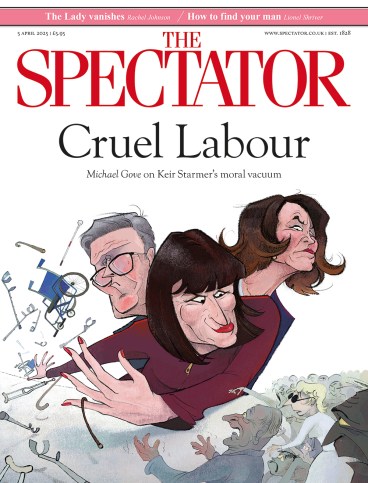
The City’s self-styled ‘cheerleader in chief’, Lord Mayor Alastair King, on a recent visit to Beijing and Shanghai found leading Chinese banks keen to expand in London. What with Chinese diplomats also keen to establish a fortress-embassy at Royal Mint Court on the City’s eastern edge, that may ring alarm bells with those who regard Xi Jinping’s neo-Maoist regime as anything but friendly. But as King also observes, ‘the tectonic plates are shifting’. All geopolitical relationships are up for review – though what follows is my own analysis, not the Lord Mayor’s.
A previous British visitor to Shanghai, chancellor George Osborne in 2015, declared an urge to be ‘China’s best partner’ in ‘a golden decade’ of trade and investment that he hoped would include Chinese financing of UK nuclear power. Then came the crushing of Hong Kong, the spread of Covid from Wuhan, the banning of Huawei from UK 5G networks and the increasingly hostile rhetoric of Xi himself. China business looked less and less attractive, while British post-Brexit hopes focused more and more on securing a trade deal with the US. What now?
The Donald Trump regime has made territorial threats towards Canada, Greenland and Panama, favours Russia over Ukraine, regards Europe as ‘pathetic’ and is at best equivocal towards the UK, save for the appeal to presidential vanity of Buckingham Palace banquets. It deploys tariffs like a loose machine gun, with no certainty that this week’s ‘Liberation Day’ target list will still apply next week.
Beijing’s leaders, by contrast, are currently a direct threat only to Taiwan, whose rulers, exiled from the mainland after Mao’s revolution, themselves once claimed sovereignty over the whole of China. Their island is arguably of concern to the West chiefly as the world’s leading supplier of microchips. The risks of cyber-mischief and intellectual property theft in dealmaking with China are well known. But for a catalogue of positive possibilities, take a look at the ‘policy outcomes’ of a recent dialogue in Beijing between Chancellor Rachel Reeves and vice-premier He Lifeng.
No one’s talking about another golden decade and we don’t want Chinese bugs in our key infrastructure. But if we’re going to sustain a viable auto industry, we need their battery technology; if we’re ever going to reach net zero, we need their solar panels; and if our world view no longer starts from the ‘specialness’ of UK-US relations, then all overseas trade links must henceforth be a matter of pragmatic risk-reward calculus. Let’s see what Xi’s people put on the table.
Eating Elon’s lunch
Speaking of tables, the Lord Mayor has another line in his tub-thumping speeches about the need for our financial services sector to ‘get out there and start eating other people’s lunch’. That put me in mind of 67 Pall Mall and other superior West End restaurants, priced for fine-wine-loving financiers rather than frugal columnists, where my spies tell me London’s long-short hedge-fund players have lately been lashing into the first-growth clarets and super Tuscans (but shunning anything from Napa Valley) to celebrate the first quarter’s hottest trade.
What was it? Smart players bought Hong Kong-listed shares in the Chinese electric vehicle maker BYD on a dip in January and sold in mid-March at a 50 per cent profit. Even smarter ones clocked another 50 per cent gain by shorting Tesla on Christmas Eve and likewise closing their position as its shares plunged last month, when sales of Tesla EVs collapsed in response to the sudden unpopularity of its major shareholder. I’d call that eating Elon Musk’s lunch.
A patriotic Isa
Huddled in quieter corners of the same exclusive eateries are another of Mayfair’s tribes: private-equity investors, whispering about bargains they’ve spotted in the defence technology sector and whether they can beat American money to the deal. Our largest defence companies, Rolls-Royce and BAE Systems, are protected from takeover by government-held ‘golden shares’. But numerous others have been snapped up by US predators. The Boston-based private-equity giant Advent led the way by buying Ultra Electronics, which makes submarine-hunting equipment; Laird, also in electronics; and Cobham in avionics. Both Laird and Cobham were subsequently broken up and sold in pieces, while Parker-Hannifin from Ohio bought Meggitt of Coventry, which supplies military aircraft components.
In the era of the special relationship; defence tech was an obvious field for collaboration with our closest and richest ally. But again we have to ask, what now? In February, Bain Capital, also from Boston, offered £1.1 billion for the listed Chemring which makes missile defence systems in Hampshire. Bain’s £3.90 per share against Chemring’s market price of £3.75 may not be rich enough to prevail. But other bids may emerge – and in a world of new uncertainties, we can’t afford to let the brightest of our smaller defence companies fall successively into unreliable foreign hands.
In drone technology, for example, I’m told we have dozens of promising start-ups. One such, the quadcopter-drone developer Malloy Aeronautics, has recently chosen the safe path of being bought by BAE. But others will suffer from the chronic British shortage of available risk-capital, compounded by lingering ‘ESG’ (environmental, social and governance) considerations which deter funds from investing in arms manufacturers.
So here’s my suggestion. The Chancellor says she’s looking at reforms to tax-free Individual Savings Accounts that will ‘get the balance right between cash and equities’ and ‘support the growth mission’. The idea of pushing Isa money towards UK equities generally has so far fallen on stony ground, but how about an additional £5,000-a-year allowance to be invested in collective funds holding stakes in public and private UK defence companies: the patriotic Rearmament Isa.









Comments